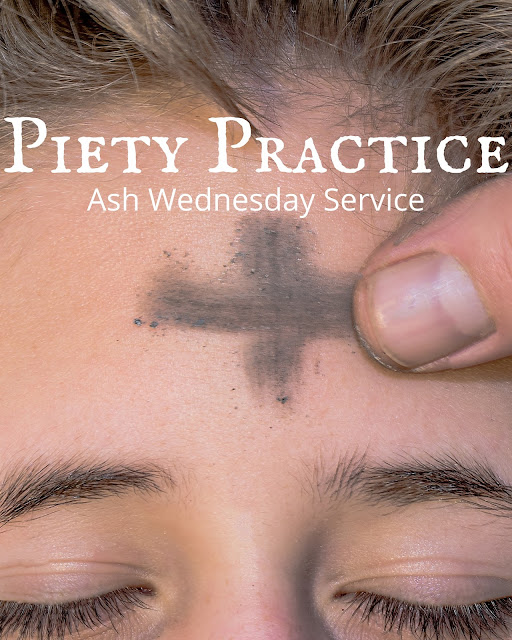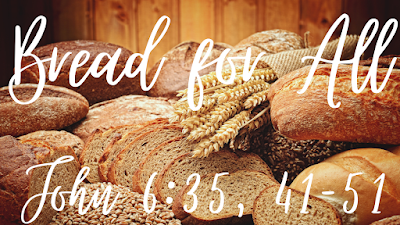Piety Practice - Matthew 6:1-6, 16-20 (Ash Wednesday C)
The word pious, to me, has a connotation problem. It has this air of religious superiority to it, doesn’t it? I mean - who doesn’t want to be PIOUS? Who doesn’t want to not only be religious but to be notoriously devoted to that religion? But piety - the noun related to the adjective, doesn’t have this image issue. Piety is reverence. But Jesus is coming for those who show off their piety.
What does Matthew 6:1 tell us about how to practice piety? Jesus wants us to check our needs to perform our piety, because he says there will be no reward in heaven for it. Said another way - isn’t he saying that there’s no benefit to acting this way on earth if God sees right through it? Our intentions matter. How we practice our faith matters. God sees all - he knows your heart, and even in our secret moments, he is with us and he cares what’s going on. That seems scary, but to be vulnerable with the One who created us, that’s what love is.
What does it mean to practice our giving in secret? Practicing in secret means that your intent is pure, that you’re not just going through the motions or trying to act in a improper way. Because as we all know, there are false teachers and false leaders out there. Why do you think Jesus encourages us not to boast about our giving? On the one hand, this brings attraction and attention that should be given with God almighty. All our gifts are to the glory of God, so boasting would be considered rude when you want to say, “look at all I’ve given!” God would say, “look at all I’ve given to you, beyond what you’re giving back to me!”
But then how does Jesus tell us to pray in verse 6? Jesus tells us to pray in private. Do we pray in public? Of course we do. We like praying in public as well because honoring God is something we should be practicing all the time. Why do you think Jesus encourages these people at this time to pray in private? Jesus encourages people to pray in private so you can go deeper in your prayer life. Public prayers are good in their place, but for those moments that you really need to be vulnerable, where you really need to repent from what’s keeping you holy, where you need to ask for forgiveness for something only God knows… you don’t need to blast that all over the town square or social media. God knows your heart. This is something that Jesus is repeating… God knows. And he loves you anyway. Praying from the depths of your soul doesn’t get rewarded just because you do it in a public place, in fact, it will most likely turn people off! Vulnerability without context is weird and makes people uneasy. It feels like someone is performing, and feels inauthentic. But Jesus knows God wants authenticity. God wants humble prayers, not ones that show off what you’re bad at or what you’ve done wrong. Maybe it’s time we take a step back and examine what we’re doing - maybe we need to go fast. Or slow? No - it’s fast, or abstain.
People fast for various reasons, whether in preparation for medical tests, or in political protests. It is one of the oldest spiritual practices in Christianity. Other faiths do it too - Judaism has several festivals during which they fast, in Islam there is fasting during the month of Ramadan. You may be familiar with the rules of some of those. But here in the United Methodist Church, we are called to fasting or abstinence as part of God’s rules as you are able. That last bit is the important part… as you are able. I don’t want anyone fasting that anyone’s doctor would warn against or might put you in the hospital. Let’s not do any of that. Before you decide to move forward with a food fast (especially a total food fast), consult your doctors.
John Wesley fasted weekly, from Thursday at sundown until receiving communion on Sunday, as the Church of England expected its clergy to do. To Wesley, fasting or abstinence were ways to express sorrow for sin and penitence for overindulgence in eating and drinking. He commended fasting to all Methodists to allow more time for prayer, and he noted that fasting or abstinence was more meaningful when combined with giving to the poor. At the same time, he advised caution against extreme fasting and urged those in fragile health not to fast from food. (As you can see - I can’t stress that enough!)
These days, there are many other things to abstain from, such as television consumption, shopping or social media. The United Methodist Church doesn’t have any special rules or guidelines to follow with regard to this practice, so you can be creative. But keep in mind, this practice is to get you closer to God. So, say you decide to give up on chocolate for the next 40 days - two things to keep in mind: when you reach for that sweet treat, and remember, instead of berating yourself on being sinful, you can pray for more control. You can praise the Lord for giving a sacrifice for the world, you can get into scripture for the time you’d be enjoying that treat. May your sacrifice be a reminder of the sacrifice that Christ gave for us on the cross, and do it in love. This is not to be a time of self-flagellation, or even setting you up to fail. This is a time of living intentionally, growing deeper to God in those moments that go unchecked. The second thing to remember is: Sundays are not counted in the forty days. If you count between today and Palm Sunday, there are 46 days (I think?) So - if you’re feeling punished or disheartened with your fasting, remember that you can take a break on Sundays.
Spiritual disciplines are important because that is where we can grow in our faith and find connection to God in our faith. When we take the time to intentionally serve, pray, do the things Jesus asks us to do, that’s where we find the kingdom of God. That is where that message in the Lord’s Prayer comes through - that we can create Heaven on Earth, as his will.
How can you practice giving this week? How can you practice prayer this week? How can you practice fasting this week? How can you practice community?
The next forty (or so days) are going to be a stretch, but that’s also why we have a community. If you’re struggling with the practice, call me, text me, whatever you need to do, but know that every other person in this room is a resource as well. Our scriptures will be highlighting temptation, failure, and much more negativity than at any other point during the year. But we are going to get through it together, and as Easter people, we know that there is more to the story than when Jesus goes up on that cross.
And as we move into why we are here tonight, let us enter Lent with an open heart and spirit, so that our sacrifices we will offer can be filled by the grace and hope of Jesus Christ.
Amen.




Comments
Post a Comment